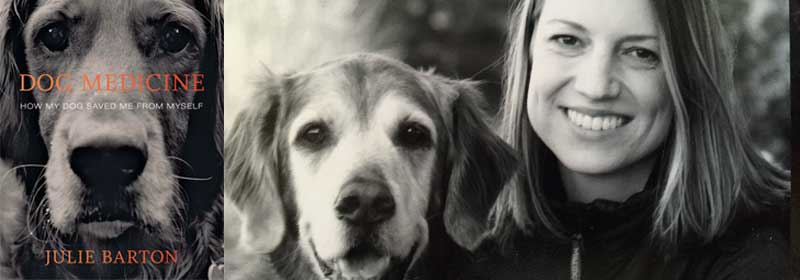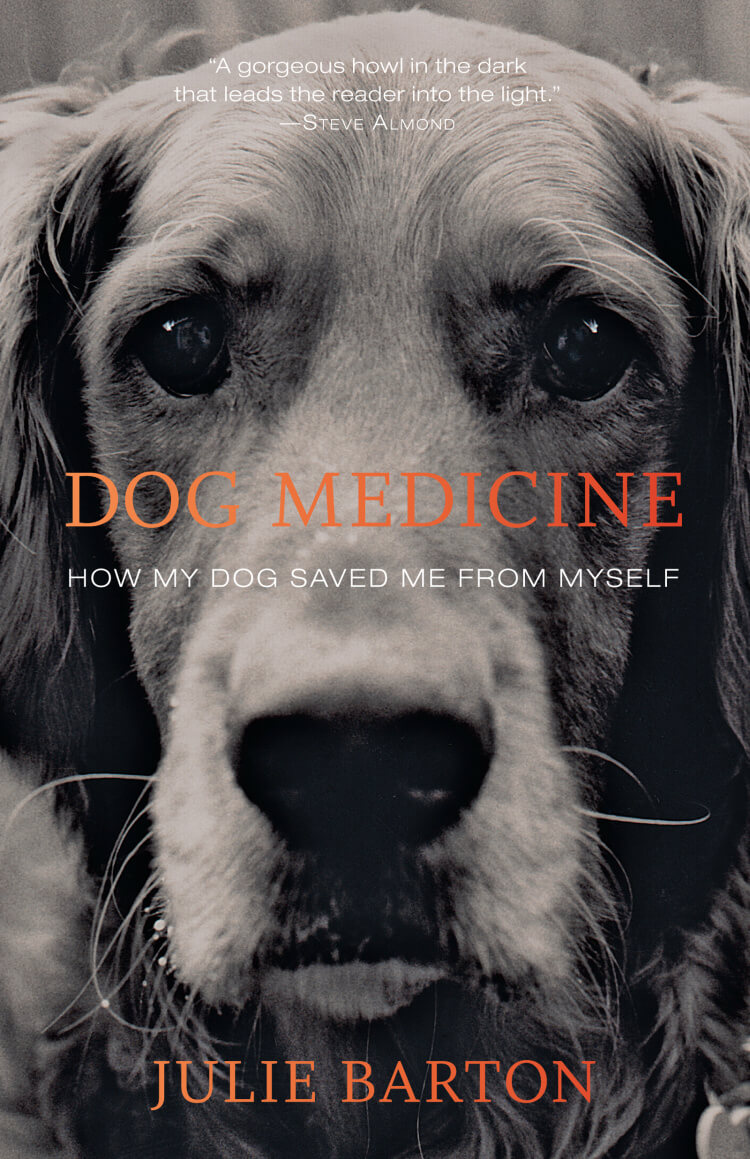

Anxiety
Can the Love of a Dog Be As Powerful As an Anti-Depressant?
Julie Klam talks about dogs, depression, and writing with Julie Barton, whose moving new memoir ‘Dog Medicine’ is a tribute to the golden retriever who rescued her from her darkest hours.
This article was made possible because of the generous support of DAME members. We urgently need your help to keep publishing. Will you contribute just $5 a month to support our journalism?
The first time I wrote about dogs, I’d been fostering this very old Boston terrier mix I thought was dying, but instead of dying, she gave birth. I had the mother, her two babies, and my own dog, husband and child in a New York City apartment. The puppies, of course, were not housebroken, and their mother who never left their side, was also not housebroken, and then my own dog who was housebroken, decided that if no one else was going to be housebroken, she wasn’t either. So my apartment became a giant litter box, except instead of boxes of litter, the dogs chose hand needle-pointed antique rugs. It struck me as funny and I wrote about it for the New York Times “Lives” column. The response was enormous. It turned out there were lot of people like me, what I came to refer to as “Fellow Dog Crazies.” This in turn brought about my two dog books, You Had Me At Woof and Love At First Bark. There were more Fellow Dog Crazies than I could count. And that is a world I am happy to live in. Especially one that is full of dog books.
It’s not a secret that our dogs bring us joy. But it’s more than that— numerous studies cite physiological benefits. People with pets get sick less and recover faster. Pet interaction tends to lower anxiety levels in subjects, and thus decrease the onset, severity, or progression of stress-related conditions. Furthermore, it is thought that the reduction in blood pressure achieved through dog ownership can be equal to the reduction achieved by changing to a low-sodium diet or cutting down on alcohol. (So get a dog and drink up, woo!)
In a new memoir, Dog Medicine, author Julie Barton takes this a step further. She writes about how a debilitating depression that was eluding doctors, therapists, and prescription medication, was helped by only one thing: the adoption of a golden retriever puppy whom she named Bunker. I spoke with Julie about writing and dogs and writing about dogs, and being named Julie (just kidding, we didn’t talk about that).

Absolutely, no question, my dog and I were and remain very spiritually connected. I started writing the book three years after Bunker died, and all throughout the process, magical things happened. When I say magical, I mean that I paid close attention and noticed incredible connections. The moon plays a big role in the book because of a moon-shaped scar on my head, and when I looked at the phase of the moon on the date of particular events, the moon’s phase or the eclipse of the moon perfectly mirrored the event happening at that time. It was astounding. And then just yesterday I realized that the Kukur Tihar festival, the festival of dogs in Nepal where dogs are honored, celebrated, and even worshipped, begins the day my book launches. I had no idea about this synchronicity—didn’t plan it at all—but when I found out about it, I thought, “Of course!” I don’t know if I should admit this, but I have an altar to Bunker in my office. It sits right behind me as I write. I believe that deeply that he was my spiritual gift in animal form, and I truly try to honor all the love and healing he brought to me.
JB: People ask me a lot whether I cried writing this book. They ask if I wept writing the awful scenes of breakdown and harrowing sorrow. The answer is no. I didn’t cry then, and I didn’t feel like I was going through it all over again. I felt like I was reporting an event. Maybe the memory was so very difficult that when I revisited it, I was like an outside observer. I don’t know. But, I do know that I did cry while writing about how my parents showed up and literally picked me up off of the ground. I cried writing about how my best friend cared for me in ways I’d never known before. I cried writing about the day I finally decided to forgive, and when I’d been granted merciful forgiveness. I cried writing the scenes about this beautiful, sacred animal, whose dedication to me was complete. That’s what made me weep. Which left me understanding: Love is what moves us. Love is what brings us to tears, so that’s the place from which I wrote.
JB: I got Bunker in 1996, when the only therapy dogs in the public lexicon were seeing-eye dogs. At the time, people laughed when I hinted at how much Bunker helped me emotionally. There was no such thing, then, as an emotional-therapy dog. So I kept my rather desperate dependence on him very private. I thought I was just weird and way, way too dependent on an animal. My least favorite sentence was, “He’s just a dog.” Because he wasn’t just a dog to me. He was my lifeline. I don’t even remember deciding that he was—it was like we just met and there he was in all his healing glory. I don’t know if it was him, because he was a particularly special dog, or whether it was just the right timing and he was the right match for me. I like to believe the former, that he was meant to find me and help me. Something tells me that’s the truth.
JB: Yes. I didn’t truly understand, even during and after writing the scenes with my brother, that the sibling abuse had affected me. It took me almost a decade to even begin understand that this is not what a child should go through at the hands of her sibling. After I had my own children, I tried to imagine them experiencing some of the fear and condemnation that I endured. That was when I finally realized—wow—that kid (me) had it pretty bad. When you internalize something, undoing it is very sticky business. Writing those scenes then reading and re-reading them helped me pull myself out of that place a little bit and realize that the self-punishing and self-hating way my brain worked made sense, given the early influences. Once I understood it this way, I could get curious about the negative thoughts that plague me instead of beating myself up for them. Just noticing them, being mindful of them, has changed my life. Writing had a big part in helping that mindfulness take root.
JB: For me, the fact that I didn’t have to pretend or explain myself around my dog was the most incredible gift. A dog never asks “Why?” I could be as sad as I wanted to be around Bunker and he didn’t care. He just accepted me. I think this unconditional acceptance coupled with dogs’ unending devotion and tail-wagging optimism is part of why they touch us so deeply. I could be a complete sobbing mess and my dog would calmly sit with me, maybe roll over and ask for a belly rub, maybe bump his big butt on mine. All of those actions always felt like a, “Hey, I’m here. Just so you know.” Also, we humans really do love to make other people happy, and we often fail. Not so with dogs. We can pick up a ball or a leash and he acts like this is the BEST MOMENT EVER. That happiness is infectious, and we feel good for making our dog happy. That bliss combined with sensitivity and quiet around a sorrowful mood equals a perfect best friend. And then there are the things we can’t explain, like when we’re in a room alone, feeling bad, and the dog is all the way across the house, but he still comes trotting down the hallway and peeks his head around the door, his eyebrows, so concerned, say, “Person? You ok? Did you forget that I love you?” They just seem to know. How can we explain that some dogs know when their owners are coming home or can sense an oncoming earthquake or can find their way back to an owner from hundreds of miles away? Connectedness, that thing we’re all seeking in our phones, in our computers, in all the wrong places. But it is very easily accessible in a dog’s eyes. Dog love grounds me. Always has, always will.
Before you go, we hope you’ll consider supporting DAME’s journalism.
Today, just tiny number of corporations and billionaire owners are in control the news we watch and read. That influence shapes our culture and our understanding of the world. But at DAME, we serve as a counterbalance by doing things differently. We’re reader funded, which means our only agenda is to serve our readers. No both sides, no false equivalencies, no billionaire interests. Just our mission to publish the information and reporting that help you navigate the most complex issues we face.
But to keep publishing, stay independent and paywall free for all, we urgently need more support. During our Spring Membership drive, we hope you’ll join the community helping to build a more equitable media landscape with a monthly membership of just $5.00 per month or one-time gift in any amount.


















































































